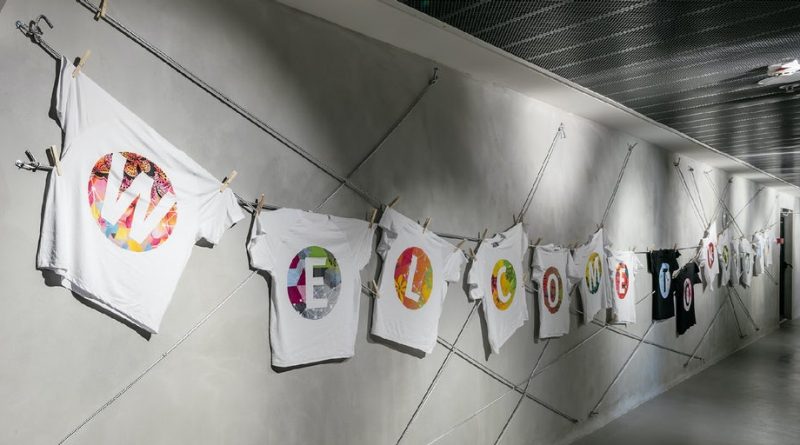Tackling Fashion’s Over-Production Problem With On-Demand Manufacturing Solutions | Sponsored Feature
TEL AVIV, Israel — The Ellen MacArthur Foundation estimates 87 percent of the total fibre input used for clothing ends up in landfill or incinerated, with less than 1 percent of textiles produced for clothing recycled, representing a “lost opportunity” of more than $100 billion annually. Both the ecological and economic impact of the status quo is driving the fashion industry to seek more sustainable solutions to inventory management, including on-demand, digital production reducing over-inventory issues.
Founded in 2002, Kornit Digital is headquartered in Tel Aviv and has five offices in the USA, Europe and Asia Pacific. The company provides innovative digital printing technologies for the garment, apparel and textile industries. The high-speed, direct-to-garment and direct-to-fabric printing solutions enable local, on-demand production of short and micro-runs at retail quality, shortening lead times from months to days or even minutes, and eliminating inventory. Kornit’s NeoPigment printing process produces zero water waste and avoids excess manufacturing of unpurchased clothes, enabling a more sustainable manufacturing process.

Omer Kulka, chief marketing officer of Kornit | Source: Courtesy
BoF sits down with Kornit’s Chief Marketing Officer Omer Kulka to hear more about how the sustainable, digital printing technology can further brands’ post Covid-19 goals while keeping up with consumer demands today.
What is Kornit’s overarching mission?
We help brands solve production challenges with smart, digital solutions for on-demand manufacturing. This aims to provide two benefits — sustainability in every sense of the word: economically, environmentally and socially; and also powers consumer self-expression.
Why do you believe the demand for digital manufacturing solutions is growing?
The fashion industry has a technologically advanced design and consumer-facing front-end that constantly pushes the envelope, but a lagging production and fulfilment back-end that is analogue and does not adapt fast enough. For years, it has been about digital samples, digital showrooms, digital designs, but not digital production. Kornit streamlines and digitises a multitude of analogue processes to join the back-end production to the front-end.
How could Kornit’s processes reduce fashion’s environmental footprint?
The fashion industry overproduces, and a significant proportion of clothing is wasted due to production of items that are never purchased. It takes about two and a half tonnes of water to make one t-shirt; about seven and a half tonnes of water to make a pair of jeans. So, each time an item is produced but not purchased, tons of water are wasted. Our methods to counter this impact on the environment starts with zero-water waste printing. The printing process is completely dry, which requires less machinery and uses less water.
It’s also eco-friendly and does not use any harmful materials. We adhere to the strictest requirements, usually set by brands as they tend to be a few of steps ahead of legislation. We align our practices with the Oeko-Tex Standard 100, so you know the clothes and fabrics made with our technology are safe.
What’s more, brands gain the most out of the Kornit technology when the distance between their production and the end consumer is the shortest. A short and digitised supply chain provides shortened time-to-market, and less wasteful fulfilment options. The real impact of on-demand printing and just-in-time production is the elimination of over-production as well as unnecessary and environmentally harmful waste.
How are evolving consumer sentiments towards sustainability impacting Kornit’s business?
Due to Covid-19, we have seen an acceleration in the need for transparency. The end consumer wants to see where and how their clothing is made, by whom and what’s in it. By using on-demand, zero-water waste printing, brands can confidently share more information about their production processes.
For years, it has been about digital samples, digital showrooms, digital designs, but not digital production.
The consumer is dictating what they want today, not retailers or brands, and the trends of what they’re buying comes from social media. In the US, market reports say that almost 75 percent of our consumer decisions are driven and impacted by social media.
This is where the on-demand comes from, which we cater to. Otherwise, brands and retailers get stuck with inventory they can’t sell and designs they can’t replenish fast enough. Covid-19 has accelerated the use of social media and, subsequently, on-demand manufacturing.
How has the recent growth in e-commerce impacted Kornit’s business?
When Covid-19 erupted, there was a complete freeze in supply and demand, but after that initial three-week standstill, but then we saw a huge acceleration in e-commerce, which shifted across the globe as the pandemic spread from Asia to Europe to the US. And we saw a clear distinction between our e-commerce-based customers and those who are not reliant on e-commerce: the former saw their sales accelerate significantly. We had customers calling us saying, “It’s like Black Friday every day.”
We expect the spike in these trends to go down and redistribute more evenly as people return to brick and mortar shopping, but it won’t go back to what it was before and the e-commerce trend is here to stay.
What future opportunities are you most excited about?
Following the explosive growth in e-commerce, we are experiencing unprecedented demand for our digital solutions. If, in the past, it was mainly driven from the design and sampling side, we now see a big push from the operational side to be more efficient and more sustainable.
Furthermore, as brands and retailers introduce sustainable, smart, digital on-demand production into their supply chain – the biggest opportunity for them is the new vision of how to sell their products and interact with customers online: endless variety of products, delivered fast and produced ethically. Kornit are the evangelists of this wave, but it’s bigger than us.
This is a sponsored feature paid for by Kornit as part of a BoF partnership.


